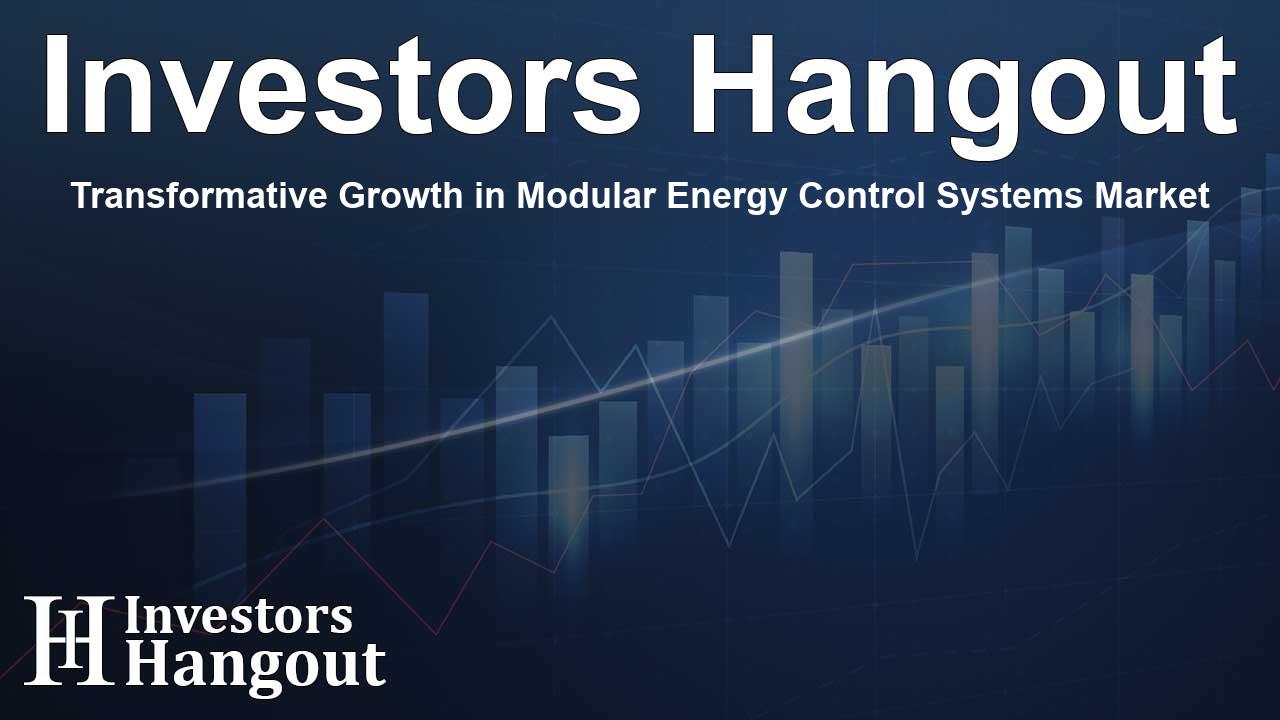Transformative Growth in Modular Energy Control Systems Market

Insights into the Modular Energy Control Systems Market
The global modular energy control system (MECS) market is poised for remarkable growth, as indicated by a recent report. The market, now a pivotal player in energy management and efficiency, is forecasted to grow at a robust compound annual growth rate (CAGR) of 8.4%, anticipating a valuation of USD 8.2 billion by the end of the future period.
Factors Driving Market Expansion
Several compelling factors are driving this market's expansion:
Growing Need for Energy Efficiency
With energy costs on the rise and a heightened awareness surrounding sustainability, there is a growing push from both businesses and consumers to adopt advanced energy management solutions. Modular energy control systems stand out by offering precise energy monitoring capabilities, ultimately leading to reduced operational costs and enhanced efficiency.
Technological Integration
Technological advancements have paved the way for integrating the Internet of Things (IoT) and Artificial Intelligence (AI) into MECS. This integration allows for real-time monitoring and informed decision-making, optimizing energy usage patterns while facilitating seamless energy distribution.
Compliance with Environmental Regulations
Countries worldwide are tightening regulations to reduce carbon emissions and encourage energy conservation. These regulations push industries to utilize energy-efficient solutions like energy management systems (EMS), driving the adoption of technologies such as MECS.
Adoption of Renewable Energy Sources
The global shift towards renewable energy sources—including solar, wind, and hydroelectric power—creates substantial opportunities for MECS. These systems are integral to integrating various energy sources effectively, minimizing waste, and ensuring optimal energy utilization.
Consumer Benefits of Modular Energy Control Systems
Consumers benefit greatly from modular energy control systems, which provide a smart framework for balancing electricity production, usage, and storage. These systems not only integrate energy from diverse sources, including photovoltaic panels, batteries, and more but also enhance flexibility and sustainability in energy use.
Surplus Energy Storage
Among the key advantages is the ability to store excess energy for later utilization. This feature is beneficial for consumers looking to maximize energy production during peak times, particularly in areas with fluctuating energy supplies or high energy costs.
Real-Time Monitoring and Control
Real-time monitoring capabilities empower users to make data-driven decisions that optimize energy consumption patterns. This flexibility contributes to long-term sustainability goals and operational efficiency.
Promising Opportunities in the MECS Market
The MECS sector is set to tap into two transformative trends:
Emergence of Smart Cities and Grids
With increasing urbanization, the development of smart city infrastructure plays a crucial role in enhancing energy efficiency and minimizing costs through MECS. Heavy investments in smart city projects create an abundant growth potential for the industry.
Alignment with Sustainable Development Goals
Global renewable energy initiatives are propelling the demand for MECS, as they act as a foundation for optimizing energy consumption within renewable power grids.
Summary of Market Trends
Key highlights include:
- The MECS market is set to grow at a CAGR of 8.4% from 2022 to 2032.
- The top three countries are expected to dominate, retaining a market share of 56.8% as of the last year documented.
- Advancements in IoT and AI are reshaping the MECS landscape by enabling real-time monitoring and analysis.
- Investments in renewable energy and smart city initiatives significantly contribute to the market's growth momentum.
Exploring Future Market Insights
Future Market Insights (FMI) provides innovative approaches to analyzing the industrial automation market through extensive coverage of various machinery, insight-rich reporting, and strategic consulting services that assist clients globally.
Frequently Asked Questions
What is the projected growth rate of the modular energy control systems market?
The MECS market is anticipated to grow at a CAGR of 8.4% between 2022 and 2032.
What drives the demand for modular energy control systems?
Demand is primarily driven by the need for enhanced energy efficiency, technological integrations like IoT and AI, and compliance with stringent environmental regulations.
How do modular energy control systems optimize energy usage?
By providing real-time monitoring and data-driven control, these systems allow users to optimize energy consumption patterns effectively.
What role do renewable energy sources play in the MECS market?
Renewable energy sources like solar and wind are vital as they create opportunities for MECS to manage and integrate, ensuring efficient energy utilization.
What are the future opportunities in the modular energy control systems sector?
The emergence of smart cities and adherence to sustainable development goals present significant growth opportunities for the MECS sector.
About The Author
Contact Dylan Bailey privately here. Or send an email with ATTN: Dylan Bailey as the subject to contact@investorshangout.com.
About Investors Hangout
Investors Hangout is a leading online stock forum for financial discussion and learning, offering a wide range of free tools and resources. It draws in traders of all levels, who exchange market knowledge, investigate trading tactics, and keep an eye on industry developments in real time. Featuring financial articles, stock message boards, quotes, charts, company profiles, and live news updates. Through cooperative learning and a wealth of informational resources, it helps users from novices creating their first portfolios to experts honing their techniques. Join Investors Hangout today: https://investorshangout.com/
The content of this article is based on factual, publicly available information and does not represent legal, financial, or investment advice. Investors Hangout does not offer financial advice, and the author is not a licensed financial advisor. Consult a qualified advisor before making any financial or investment decisions based on this article. This article should not be considered advice to purchase, sell, or hold any securities or other investments. If any of the material provided here is inaccurate, please contact us for corrections.
